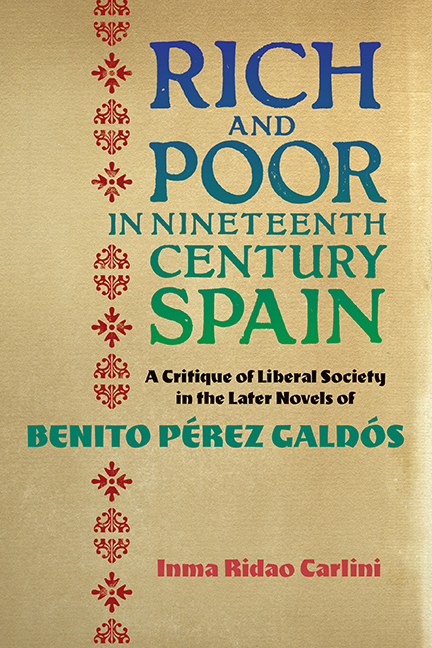 Rich and Poor in Nineteenth-Century Spain
Rich and Poor in Nineteenth-Century Spain Book contents
- Frontmatter
- Contents
- Acknowledgements
- Abbreviations
- Introduction
- 1 Changing Fortunes and the Financial World in Galdós's Lo prohibido
- 2 From Usurer to Marqués: Lending and Social Advancement in the Torquemada Novels
- 3 Revolution and the Politics of Religion in Ángel Guerra
- 4 The cuestión social in Misericordia
- Afterword
- Bibliography
- Index
Afterword
Published online by Cambridge University Press: 05 July 2018
- Frontmatter
- Contents
- Acknowledgements
- Abbreviations
- Introduction
- 1 Changing Fortunes and the Financial World in Galdós's Lo prohibido
- 2 From Usurer to Marqués: Lending and Social Advancement in the Torquemada Novels
- 3 Revolution and the Politics of Religion in Ángel Guerra
- 4 The cuestión social in Misericordia
- Afterword
- Bibliography
- Index
Summary
This book has analysed Galdós's critical engagement, in seven of his Novelas Contemporáneas from the 1880s and 1890s, with some of the fundamental social transformations brought about by the development of a liberal political system and a capitalist economy in Spain. As I have shown, Galdós represents the Restoration bourgeoisie within a historical perspective, linking its wealth and social power to such policies of the liberal state as the desamortización, and to the speculative possibilities of a market economy. Chapter 1 has highlighted the way in which José María, the narrator of Lo prohibido, traces the origin of many of the fortunes that form his social milieu to the economic expansion of the 1850s and 1860s. The speculative activities in which these characters engage, such as the stock market, government concessions, the railway, private lending and investment in property, coincide with what modern social historians consider to be the backbone of nineteenth-century Spanish economic development. Through the account given by José María, moreover, Galdós stresses the corruption that permeates this world of high finance. In this way, the abuse of government concessions and involvement in the Cuban slave trade and plantation system are to be found at the root of some of Lo prohibido's spectacular fortunes. This corruption in Madrid's business world has its parallel in the hypocrisy and self-interest that guide many of the novel's personal relationships. The search for social status is the main motivating force for many of the bourgeois characters in this novel, and the frantic and competitive consumerism in which they engage, often financed through credit, becomes a means towards realising their social aspirations. It is, indeed, the need to make a social display of status that fuels lending, one of the most profitable speculative activities in Galdós's Novelas Contemporáneas.
In the four Torquemada novels, which have been studied in Chapter 2, the narrative of Torquemada's social ascent, from his working-class origins as a small-scale usurer to becoming both a prominent member of the Madrid financial elite and an aristocrat, parallels the development of capitalism in Spain. As in Lo prohibido, the activities that enrich Torquemada are speculative and often corrupt. It is thus ironic that he presents himself as a self-made entrepreneur in the speech that he gives at a banquet held in his honour.
- Type
- Chapter
- Information
- Rich and Poor in Nineteenth-Century SpainA Critique of Liberal Society in the Later novels of Benito Pérez Galdós, pp. 195 - 198Publisher: Boydell & BrewerPrint publication year: 2018


